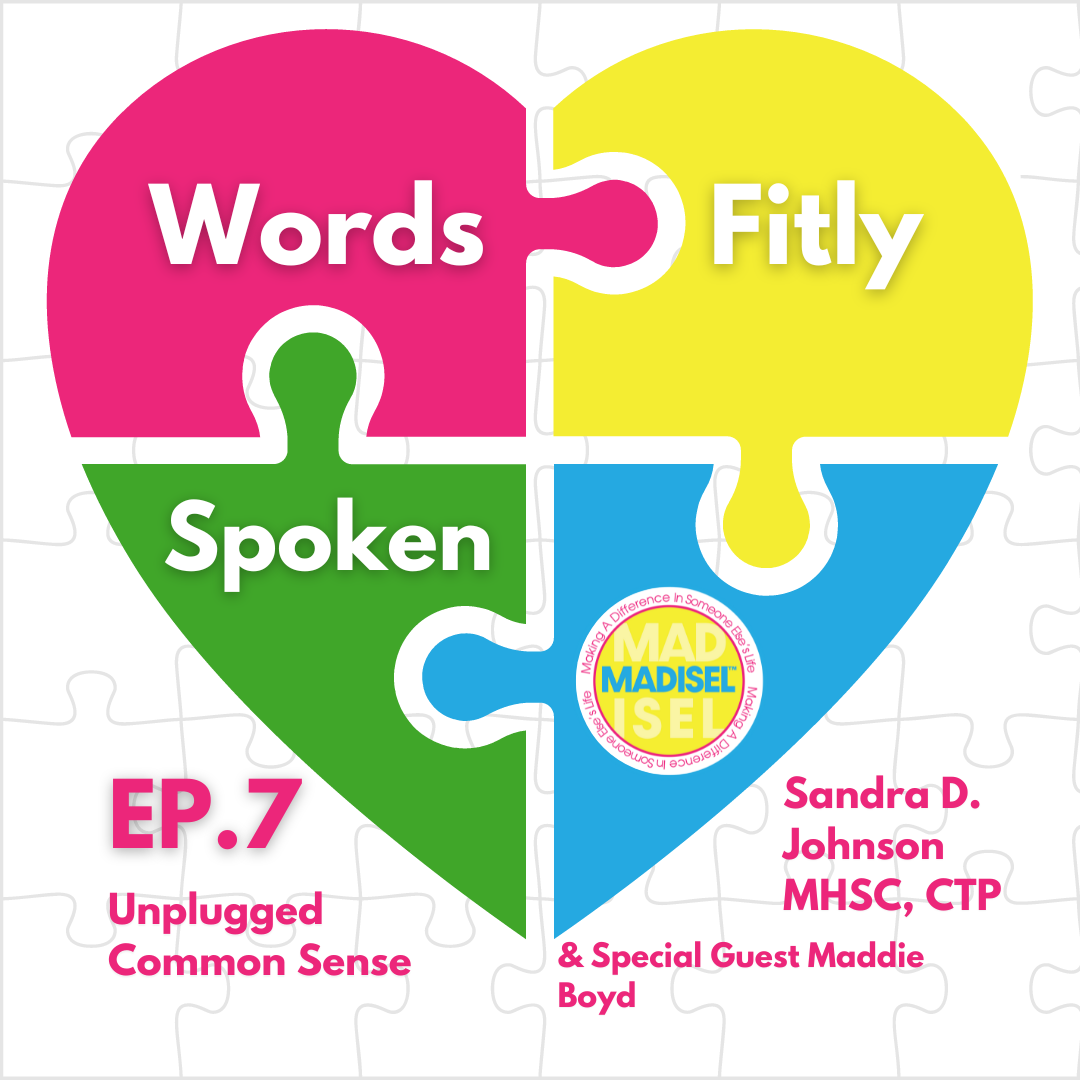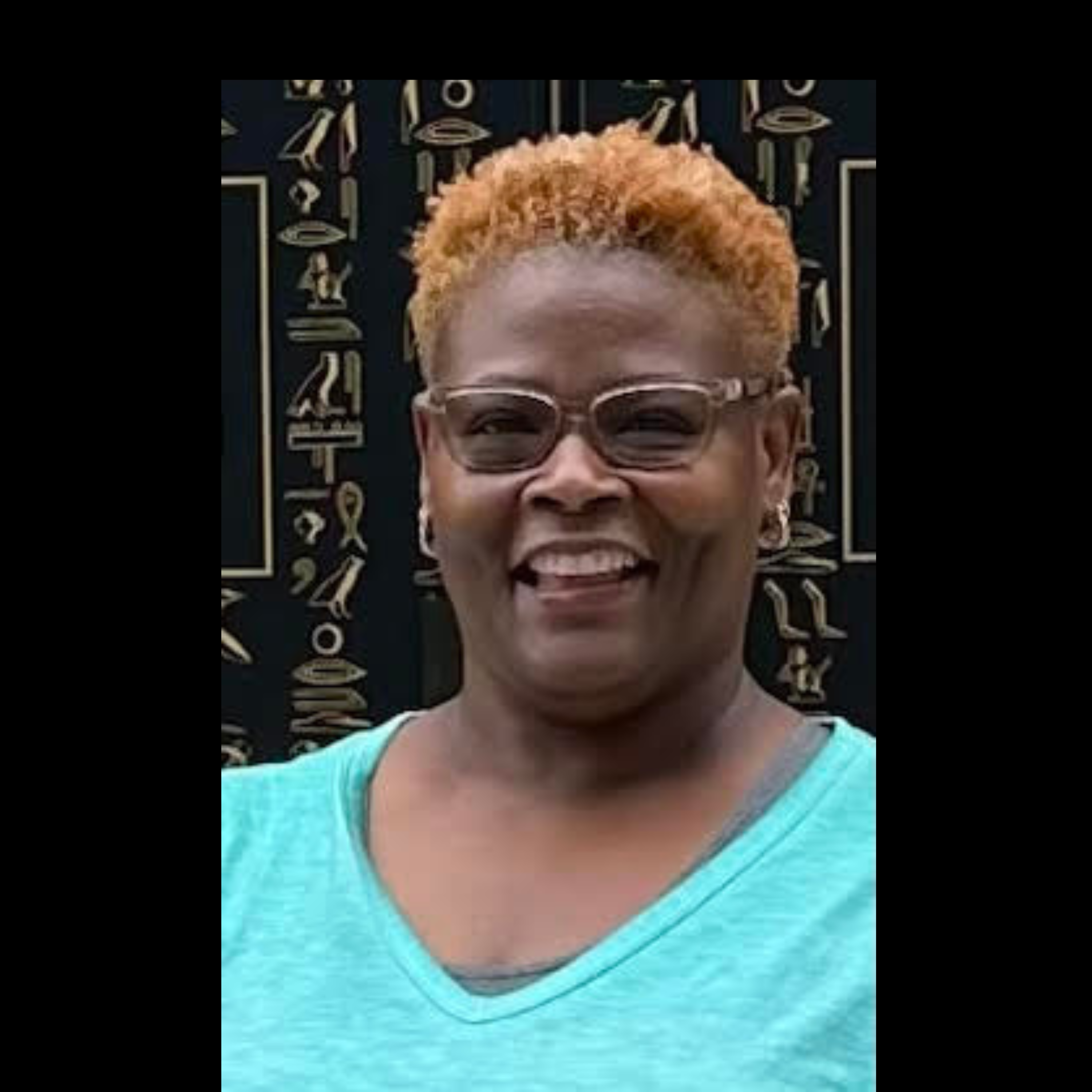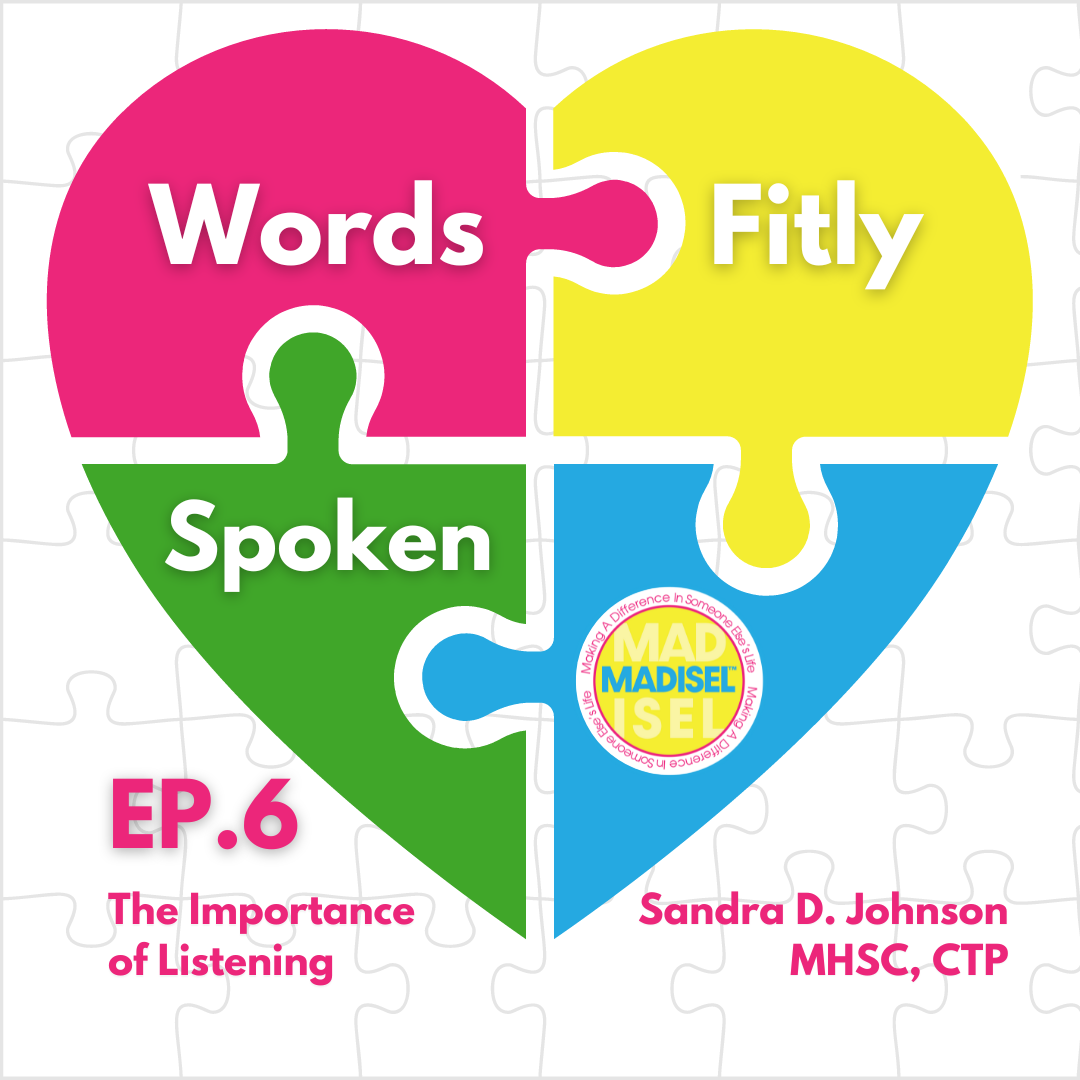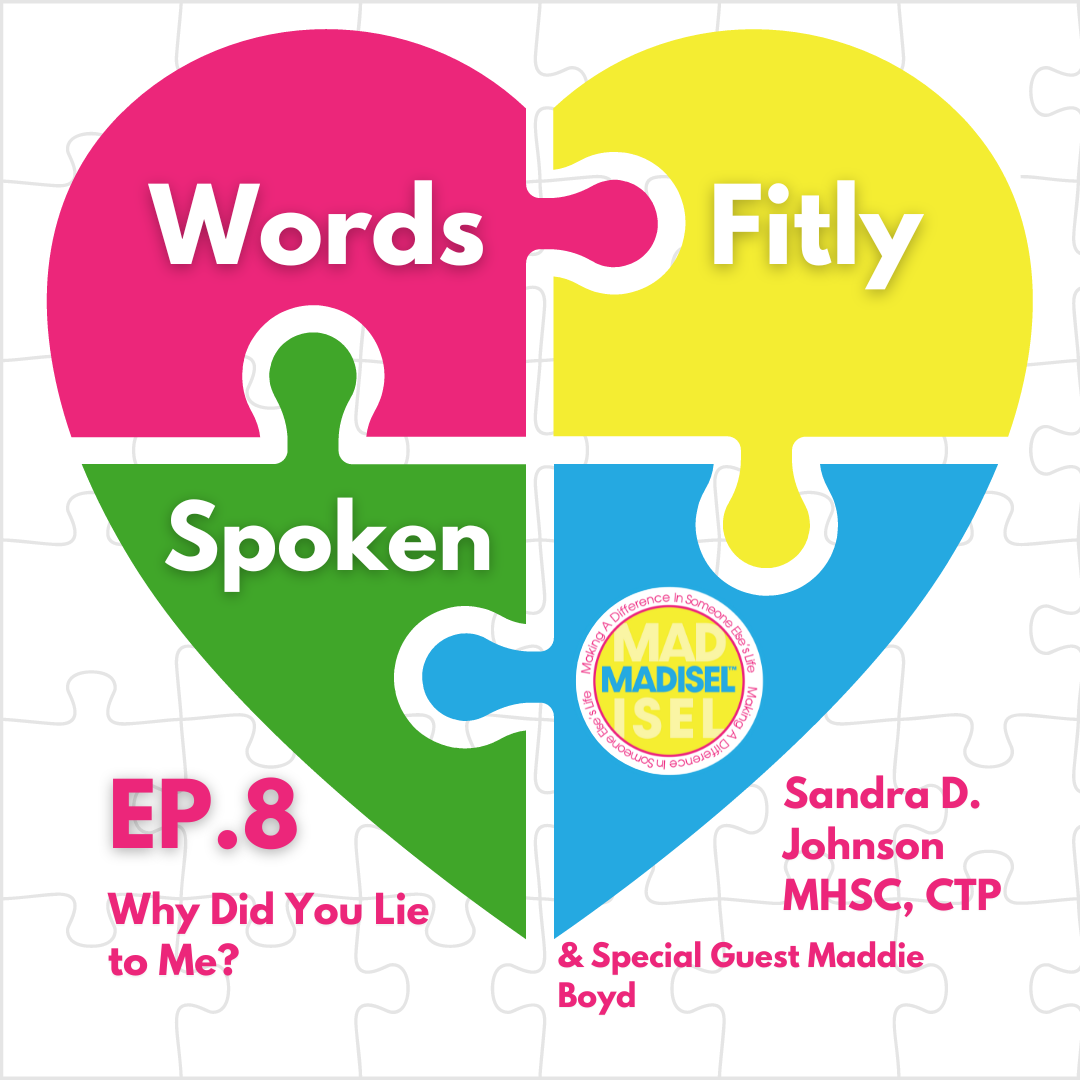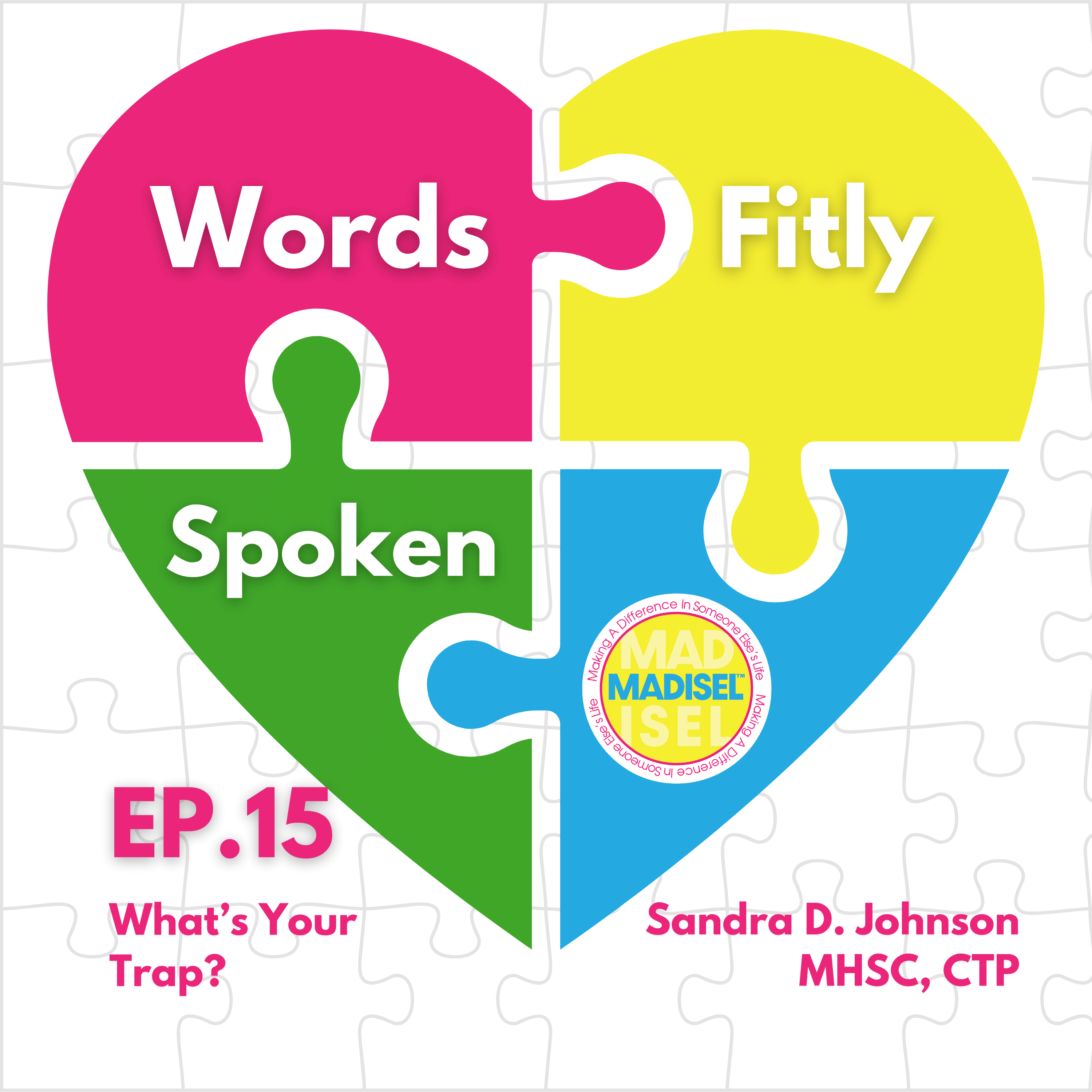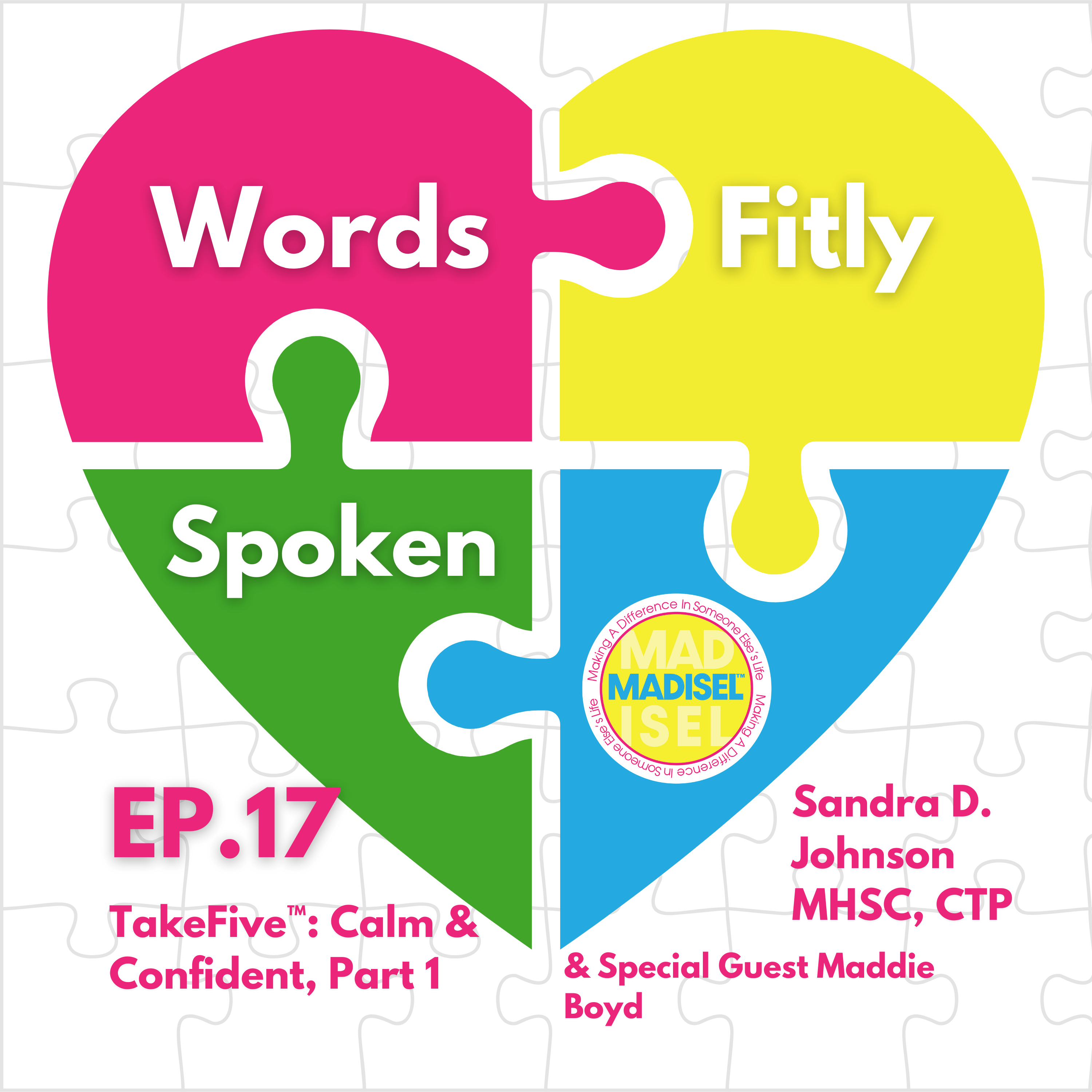Listen to a dynamic discussion with a young adult talking about the parent/daughter relationship. We uncover some powerful life lessons about family relationships, judgmental behaviors, and the mishandling of common sense. Special guest, Maddie Boyd, College Intern for our company, the MADISEL Group.
View Full Transcript
Episode Transcript
Welcome to at MADISEL Coach and MADISEL TV's Words Fitly Spoken podcast. Hello there. I'm Coach Sandra, and I'm the host of Words Fitly Spoken podcast. Words Fitly spoken are words spoken at the right time for your encouragement and enrichment. On this podcast, we will deal with emotional and mental wellness by talking about the conflicts we have in our everyday relationships, whether at home, work, school, and the community.
Stop in to hear some helpful words that create awareness about your emotional health. All right. Hey everybody. Thanks so much for being here today. We are excited because we have our first guest. Welcome, Maddie. Thank you for having me. I'm so excited to be here. It is wonderful to have you. So I am gonna ask you to go ahead, um, and just say your name and talk about how we're connected.
Mm-hmm. All right. So my name is Maddie Boyd. I am a student at U N F and I am interning for MADISEL. I started in January and it's been a great ride so far and I'm so excited to finally get on this podcast and get to talking with Sandra. Excellent. Excellent. Yes. Thank you so much. You are, um, definitely. A great find.
I am so excited to have you on the MADISEL team, and like I said here at the, at the podcast for MADISEL Coach, you are our first guest. And so we are gonna just take on a couple of topics and we're gonna see how this goes. What's neat about having Maddie join us today, which is, you know, really encouraging to me, is having a college student, a young, a young adult, being able to talk about and share her perspective.
Of how these things happened, um, in life and what affects her, her and her age group, right? In the times we're living in, and for many who know me, I do a lot of work with teenagers and their parents, and Maddie is not too far removed from that particular. Area of living. So a lot of the conversations that you and I already have deal with, um, the family dynamic and what it's like being a daughter and what you've learned from your parents and what you've tried to also encourage them in and teach them in, because I believe that.
The, the young person is a teacher in the home, just as well as the parents are a teacher in the home. Yes. That's so true. Yeah. Yeah. Excellent, excellent. So since I said that we were not gonna start there, but I'm gonna go ahead and do what I do. Let's start there. Okay. What is something that you remember?
About your own personal journey that you feel you ended up having to teach your parents about you? What did, is there anything that you can recall, you know, in those teen years? And it could be, it may, it could even be now, right? That you're learning how to teach them and how to share some things about yourself that you know how.
'cause sometimes what happens with our parents, They think they know us. Yes. And but it really requires them listening mm-hmm. To really know us. Right? Yeah, absolutely. And watching Absolutely like using your, your ears and your, your ears, your eyes, and you know, interacting with the relationship to really know someone.
Right? Yeah. Yeah, I can definitely speak on that. I think something that I really liked. Teaching my mom specifically was that we have a completely different perspective on our lives, and that's something that is kind of hard to accept as a parent, I think, because you as a parent have this completely different outlook than your child had.
And so when my mom remembers this certain event that happened in her life, Maybe something that was hard for her or something that she went through. I'm remembering that event in a completely different way, you know, and I'm not, and you shouldn't judge each other. That's something that we also had to learn.
I can't judge her for seeing the things that she saw at that time, and she can't judge me for how I perceived it as well. Oh, that's excellent. That is excellent. So, um, in another podcast I talked about, An aspect of what you just brought up, how we will get into this thing of that our experiences are identical.
Yes. They've never been identical. We experience things differently. Mm-hmm. And what I am learning, you know, as a lover of emotional and mental health is how our emotions, though we have identical emotions, they do not line up or level up. At the same place. Yes. And the one that is so unique, what I like to call the squeaky wheel, right.
Anger. So I feel like this situation happens in our relationships where, so let's just say for you and I mm-hmm. And it could have been you and your mom. It could be you and siblings, you and dad, anyone. But, so they're mad about something. Right? Right. And then you, you happen to be there with them and, and you see that thing and you're like, wow, I'm, I'm not really that upset about that.
Mm-hmm. We as humans will get mad at someone and say, why are you not mad at what I'm mad at? Yes. So I I'm gonna get more mad at you for not being mad at what I'm mad at. Mm-hmm. Okay. That really is, uh, a little bit. Unbalanced Right. A little bit. A lot. It doesn't really make sense. It's not good for us.
Yeah. Right. And yet we hold onto it like it's, you know, this cloak or it's oxygen. Yes. Right. We don't wanna let go of these things where it's like, I don't need to be mad at you because you're not mad at what I'm mad at. Right. The way I experience the situation, it's different from your experience. Mm-hmm.
And I need to honor that. Yeah. Instead, I'm spending energy and causing more conflict. Right. Yeah. In our relationship. Just because you didn't agree with me. Right. Because really that's what it comes down to, right? Because we all wanna be, right? Yeah, we do. Yeah. We just, ah, it's human. It is, it's so human and like I want no one to stop being human.
Right. Right. But I, all of us have to recognize if I'm doing something that is not really helping my relationship. More than likely I'm hurting it. Yes, and that's the really hard part, is being self-aware enough to recognize that, because sometimes you're so caught up in the midst of being angry or the situation that we as the struggling individuals are in that we can't realize.
I'm doing more hurt than help, and that's good. And it's hard because we're hurting, so we're just expending all this energy trying to make ourselves feel better. Right? And we're not realizing we're just creating more and more and more damage. That's good. That is really good. So thank you. 'cause we, what we just did, we started a topic and we rolled off into another topic.
Yeah. And I love that. So thank you for joining me in that type of Mattis self stuff. So thanks. I love how the interaction, what you talked about when we go back to you and mom. Mm-hmm. And you had that connection with. You know, you had to, you know, help her to see you the way you really need to be seen.
Right? Yeah, absolutely. And um, and that's important in every relationship that we have. Yeah. So one of the other topics I'm going to jump right into one of our other things that we wanted to cover today, and understanding that what Mattel tries to put out is not just. What's helping us in the moment, but what help, what helps others who are gonna be listening, no matter when they're listening to a podcast or watching this podcast, but it can be helpful to them for whatever they're experiencing.
And so the topic I want to grab a hold of right now is the topic of common sense, right? Common sense. So here's what I did. I went and. I wanted to look up the definition, right, um, because we all have our idea of what common sense is. And so let me just back up a little bit and say I was in a conversation with some people.
I was sharing with them how I think as an older generation, I. That I'm a part of now we need to make sure we stop saying certain things. Mm-hmm. Absolutely. And so specifically I think, um, my generation and anyone close into my age range and older Yeah. We've gotta stop saying about young people that, you know, you guys have no common sense.
Yes. Or, and I mean, we'll say it about our peers as well. Well, they have no common sense. Right. And so, What I did is I, um, I was sharing with that group and I said, Hey, you know, I really think it's not a good thing. It's not a healthy thing. It's really a bad word. It's a bad phrase because it's condescending.
Absolutely. It's extremely judgmental. And so in just doing a little bit more research, so doing a little bit more research, looking at what common means, dictionary.com says it this way. Belonging equally to, or shared alike by two or more, or all in question. Some examples are common property, common interest, right?
Mm-hmm. Uh, so equally belonging to another definition is pertaining or belonging equally to an entire community. Nation or culture. An example is a common language, common history, um, a common water supply system right now. So I then have this question of is common sense really common? So tell me, Maddie, being in your early twenties, Am I right?
Yes. Early twenties. So tell us, hey, is common sense really common? I think that that second definition really brought it into perspective. Like it could be a common language for a hundred people, but then the common language for a different a hundred people is a completely different language. And so what we're really need to realize is that everybody's common is different.
My common is completely different from yours because, a, we are not the same age. We didn't grow up in the same place, and we just have had completely different experiences throughout our entire lives. And you obviously have a lot more experience. But as you have mentioned so many times in our relationship, that doesn't mean that we can't still learn from each other.
Yeah. Absolute. And we kind of ran into that today when we were talking about Instagram. And so obviously as a younger generation person, Instagram is more my forte. And so we were talking about. Making a post. And I said, oh, the caption. And you said, is that, is that what it's called? And for me, in my generation, a caption is common sense.
But for you, it, it wasn't completely common sense. And I could have judged you for that, but absolutely. I obviously didn't. And it's, thank you. No, of course. But. We, that's what we have to realize is that we could judge someone for not knowing something so simple. But that's not in your era. I mean, Instagram is a completely new thing that hasn't been around since you were.
10, 12 years old, I mean Right. Brand new. Okay. Yeah. Absolutely. I'm, I'm absolutely a novice. I have no problem saying, Hey, you know what? Social media, I see you. I'm learning how to use you, but I need a young person to school me. Right. Yeah. And that's what I'm here for. Absolutely. Absolutely. Yeah. So, and I love it 'cause we, I was looking at you like, Do you not understand what I'm saying?
Right. I wanna know about the post. What about the, and, and you had gave me the example of like, oh, you mean the paragraph, the place where Yeah. That thing, isn't that what I, am I not saying it? And you're like, it's a caption. Right? And I, I was like, wow, I didn't know that. Right. I didn't know that's what your younger generation is gonna call something.
And you know, in that we, we just really begin to connect on that fact of Wow. My common is not your common. Absolutely. So for the older generation, right. Let's go ahead and school all of us on this for the older generation to be coming at a younger generation because a younger generation doesn't say to us, you guys should have common sense.
No, no. You guys don't even use that term, right? No. It's the older generation. Yeah. We are coming at you guys and, and saying this and really. We're interesting about how we say it when we say it. We're usually in a group of our peers. Mm-hmm. Um, and we say it in a very condescending way. Right. To say, look at them, man.
They have no idea. Ugh. I guess they're just no more common sense. Right. Really, one of the things that, Maddie, we were just having a casual conversation about this, but. One of the things that stopped me in my tracks that she shared with me earlier about coming. First of all, let me just say I'm a, I'm a Floridian now.
I was born in Chicago, so I'm going to go ahead and give credit where credit is due ly. Okay. Cook County. Thank you, Chicago. Alright, so I was born in Chicago, but I was raised in Jacksonville. So I'm gonna go ahead and re recognize my city. Mm-hmm. And my county. Doval. Thank you. Very good. That's good. You're home.
That's very good now, but Maddie originated from another state and a small town, and so tell 'em the state you're from in your town. Okay. I am from California and the town that I'm from is specifically Portola. It is a very small town. The population is around 2,500, and we are tucked away in the mountains of, uh, California.
It's very northern. It's actually right on the border of Nevada in California. Wow. So right by Reno. Wow. Wow. So when we were talking and you were just sharing about the common sense thing, and it was just like, That wasn't common where I'm from. Exactly. So here you are in a lot of ways, there's a deficit.
Mm-hmm. Right? And, and it's, that's not a bad word. Yeah. So you just didn't have exposure to certain things. Yes. Then to come here to this geographically super large city. Yes. And there's stuff you know, everywhere. And you're meeting people from a lot of different places as well. Mm-hmm. That you wouldn't normally have experienced in your small town in California.
Yes. Right. Because we hear California, we immediately think. Big state. Yeah. La la. Yeah. You know, everything is, you know, glitter and Hollywood. Right. And we're thinking all of that. Yeah. And you're like, no, not anywhere near me. Not, absolutely not even close to what I experienced as a child, and when I go home from college.
Right. Because it's still snowing there right now in March. Right. It's the end of March. We just had a flurry last night. Yeah. So, you know, shout out to the parents. Yeah, we see you guys keep keep but we don't wanna be there. No, we're good in, we're good in here. We are good with our weather. It's beautiful outside today.
It is. And so, Again, it just, that was so, um, uh, I'm a loss for words here on that one, but that one, it was like, it wasn't that, it was shocking, but it was sobering. That's the word I wanted to use. It was sobering because it was the idea of look at how we have, how we're doing things in our relationships.
It's just not healthy. Yeah. Like it just screamed at me even more. We have to stop. As an older generation, using the phrase common sense, these young people don't have common sense. What's common to me is not common to my neighbor. Yeah. If I am truly honest, it is not common to the person sitting right next to me.
And really what we're communicating is because you don't do it my way. You're the problem. Yes. That's, that's not right and it's not fair to the other person because we go through so many different experiences and we have have different experiences throughout life that shape our common sense. So say you grew up, you know, driving in a city, which you did, you grew up driving in Jacksonville, but I grew up in a tiny town where there was no freeway.
So I had very little experience on the freeway up until, you know, late high school, early college years. Right, right. And for you, getting on the freeway is probably quote unquote common sense, but for me it wasn't. And so there's just little things throughout our lives that we make judgements on for other people, when really it's, it's no one's fault or it's no one's, you know.
It's not for us to judge, because that's just their life. It's not, it's not something that they lacked. That's right. Or something that we are better than them for. It's just completely different experiences. That's right. And your experience is your story. Mm-hmm. And your story is beautiful. Yes. Right.
Because you are, you're the, you're the star of it. You're the main character of your story. Yeah. I'm the main character in my story. Mm-hmm. My story brought me from Chicago to Jacksonville. Mm-hmm. I've been to some different places, um, and there's still places I wanna see in my own country and abroad.
Yeah. To add more chapters to my story. Yeah. It's a beautiful thing. So it's not about having a common story, right? Mm-hmm. It's about. Learning how to be in life. Yeah. Who you're supposed to be in life, but honoring someone else's differences. Yeah. And not putting 'em on the spot because they don't think the way you think.
Mm-hmm. They don't look the way you look. They don't react to what you react to. All of that is okay. Yeah. Because what we have in common, the key thing is we're human. Right. And if we would just take time to be common there. I start realizing, man, I don't have the right to judge you. Yeah. Who am I? I, I, I'm not better than you.
I'm not less than you. I'm not greater than you. I'm not less than you. I'm equal to you. So your valid story is beautiful. My valid story is beautiful. Absolutely. I love that. Awesome. Awesome. Thank you. That's great. Just dealing with the topic again of common.
Make sure you like, comment, subscribe. We want to share this great information. With a multiple of people and you get to help us with that and we totally appreciate it.
Thanks for joining us. We will see you next time.
